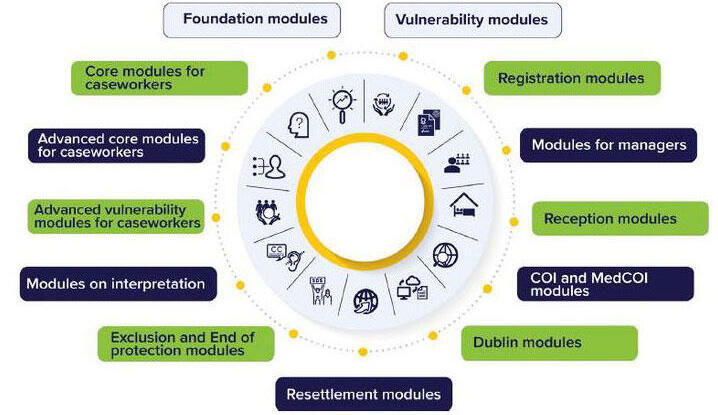> Overview
See key facts and figures on EUAA training in 2022 as well as a focus on the response to the war in Ukraine.
> Training Activities
Here you can find more details about training activities carried out during the year.
> Observations&trends
This section presents findings about delivery trends and learner feedback.
> EAC
Here you can find key figures and details about the European Asylum Curriculum modules.
European Asylum Curriculum
The European Asylum Curriculum provides the basis for a common, vocational training system for officials working in national authorities responsible for asylum and reception. Under certain circumstances it is made available to other relevant national administrations and organisations whose staff require training in the competence areas covered. It is used throughout the European Union as well as in third countries in the context of capacity building activities. The curriculum also forms the basis for training delivered in an operational context supporting countries whose asylum and reception systems are under disproportionate pressure from migratory flows. The training enables deployed personnel to swiftly become operational, ready to provide on-the-ground assistance.
The curriculum tangibly supports the harmonisation of practice
The curriculum has been developed in line with Article 8 of the EUAA Regulation and builds on existing cooperation within the EU in the field of asylum to promote best practices and high standards in the implementation of EU law on asylum. Member States are obliged to include core parts of the curriculum in the training they develop for their staff. The curriculum tangibly supports the application of the Common European Asylum System.

In 2022, the first of a series on online only modules were launched which provide the basic knowledge necessary for any person working in the field.
- Introduction to the legal framework on fundamental rights and international protection in the EU
- Introduction to communication for asylum and reception practitioners
- Introduction to ethical and professional standards
- Working with an interpreter
The EUAA continued to implement new instructional design principles in all new and upgraded modules of the European Asylum Curriculum.
Consult the online European Asylum Curriculum catalogue here or the PDF version available here to find a comprehensive summary of all the curriculum modules and the languages in which they are available. It includes essential information such as the target learners, the learning outcomes, a module overview, the mode of delivery and the duration of the training.
You can find out more about the delivery of the modules in the tabs below. The following grouping of modules was used according to thematic area or target group. Some modules are relevant to more than one area:
- Foundation and introductory modules provide essential information about the legal framework and fundamental rights applicable to asylum seekers. They also include training to build essential horizontal skills.
- Modules for asylum officials include core modules for case workers which provide a structured method for interviewing applicants, assessing their claims and deciding on whether they fit the criteria for international protection. There are also a wide range of modules dealing with areas of specialisation.
- Vulnerability modules ensure that vulnerable persons are identified and their needs met throughout the asylum process.
- Training in the area of reception looks at how obligations can be implemented practically to improve efficiency and the quality of reception conditions.
- Modules for trainers enable Member States to train their own trainers. National asylum and reception authorities can then construct training paths to suit the needs of their asylum and reception officials.

